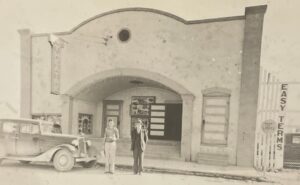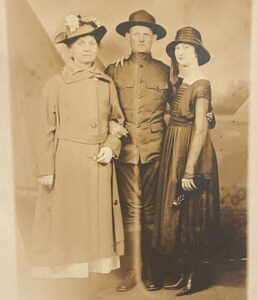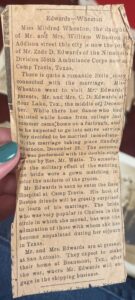calsfoundation@cals.org
The Triumph of Memory: Conversation and Preservation
Watching someone you love succumb to death over a long period can twist how you think about time. It feels like you have so much and none at all—both at once. Every conversation feels both precious and mundane.

My grandmother’s death was like this. She was sick for several months out of the year for the last few years of her life. There was always an ingrained assumption that she’d bounce back, that we’d have more time, until we didn’t.
When she passed, and we then began the difficult work of going through her belongings, my aunt introduced me to a treasure trove of archival material. The material not only documented my grandmother’s rich life spent all over the world, but the lives of her grandfather who operated the first movie theater in Sour Lake, Texas, and her father who served in the ambulance corps in France during World War I. Stories began to unfold from the photographs and letters left behind.

One such story is of the marriage of her mother and father. As I was looking through the photographs, I found one of what appeared to be Zede, my great-grandfather, standing between his mother and a woman in a dark dress. My aunt could identify Zede and his mother, but not the woman on the right. Because my grandmother had kept so many mementos, there were also news clippings with the items. In the news clippings, I found a marriage announcement for Zede and his wife Mildred. In the announcement, the paper noted that the wedding was small and had been held in haste before Zede was deployed to France, where he had enlisted in the ambulance corps. Family lore says he was a pacifist who wanted to serve his country during World War I, but not in a combat capacity, so he enlisted before he was drafted to make sure that he was not put into a combat position.
The clipping also mentions that to “accentuate the military effect of the wedding, the bride wore a gown matching in color the uniform of the groom.” With this information, I was able to deduce that the unidentified woman in the photo was in fact Mildred, and this was a portrait taken on the day of their marriage before Zede went to war. Without the long-term preservation of these materials by my grandmother, this story would have been lost to time. This is just one of many amazing stories these materials tell.

While spending time in the hospital in the last week of my grandmother’s life, I was reading Anthony Doerr’s Cloud Cuckoo Land, a book that weaves the timelines of characters spread over centuries through their connection to the fictional epic “Cloud Cuckoo Land.” As I read the book, the power of story to connect people over time really resonated with me. In particular, the quote: “The premier achievement of human history [is] the triumph of memory over the obliterating forces of destruction and erasure.”
Because I am a historian, there’s an expectation that I would have made a point to talk to my grandmother about her experiences as a child, as a military wife, in her later life serving her community, and in raising her family. I have many reasons for why this didn’t happen, but after her death none of them seemed good enough. I felt like I had in many ways done my grandmother a disservice by not recognizing the importance of capturing her memories.
But we still have the photographs, letters, and scrapbooks that she kept safe all these years. As an archivist, I can use my skills and training to preserve these materials. And as a historian, I can use my research knowledge to help rebuild the historical context surrounding their creation. I can do my part to preserve these memories.
In part, this is a cautionary tale about having these important conversations with the elders in your life before it’s too late, but it also presents an opportunity for those who didn’t get the chance. Through the resources available at the Roberts Library, including personal archiving classes, genealogy resources, oral history toolkits, and the Memory Lab, these stories don’t have to be lost to time. We have the power to save them for the future.
Come visit us at the CALS Roberts Library to start or continue your own family research journey; hours and visiting info. are here.
By Danielle Afsordeh, community outreach archivist at the CALS Butler Center for Arkansas Studies/Bobby L. Roberts Library of Arkansas History & Art




